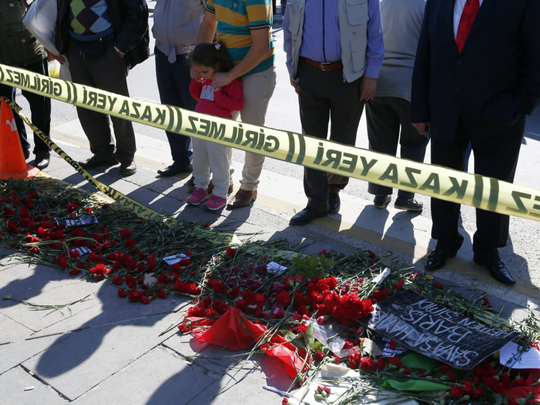
The carnage wreaked by the twin suicide bombings in Ankara last Saturday, which killed more than 100 people who had gathered to protest the resumption in fighting between Kurds and security forces in south-east Turkey, has provoked bitter recriminations ahead of a make-or-break general election on November 1.
The bombings, assumed to have been conducted by local cells of Daesh (the self-proclaimed Islamic State of Iraq and the Levant) even by the neo-Islamist Justice and Development party (AKP) government, have brought under the spotlight three unhappy trends that interlock tightly, even as the bonds that hold Turkey together are loosening.
First, there is a widespread sense that this latest terrorist attack, the worst in Turkey’s history, is partly the result of government negligence that borders on complicity. Since before the June general election, in which the AKP lost its majority for the first time since 2002, there have been hundreds of attacks on offices of the People’s Democratic party (HDP). The HDP is a civilian outcrop of the 30-year insurgency waged by the proscribed Kurdistan Workers’ party (PKK). The electoral breakthrough of this pro-Kurdish coalition in June confounded the plans of President Recep Tayyip Erdogan to move Turkey from a parliamentary system to presidential rule.
There is little evidence the Turkish state is investigating these attacks, nor even the Daesh bombing that killed 34 young activists at a Kurdish cultural centre on the Syrian side of the border in July that reignited the PKK battle with the state. This gives Kurds and Turkish opponents of Erdogan’s one-man rule ambitions the sense they no longer enjoy the protection of the state.
“When is negligence complicity?” asks Hakan Altinay, former head of the Open Society Foundation in Turkey, now at the Brookings Institution, who fears the “social fabric [of the country] is unravelling”. An online poll by Hurriyet, a newspaper that has recently suffered two attacks, one led by AKP members, reported that 76 per cent thought the outrage in Ankara showed negligence by security forces.
Second, lack of trust, ahead of the re-run election in which Erdogan’s grip on power is at stake, has led to division rather than the closing of ranks that typically follows a tragedy of this magnitude. Despite the bombings, the PKK called a ceasefire until the elections are over. Ankara is continuing its state of siege across the south-east and air strikes on PKK positions across the border in Iraqi Kurdistan.
Despite daily official denials, there is no shortage of people who believe the AKP establishment is in league with Daesh. There is no hard evidence for this, even if Ankara’s permissive policy, until recently, towards extremist volunteers and arms heading for the fighting in Syria has made Turkey vulnerable to Daesh infiltration. What is certain is that the AKP and Daesh now share a common enemy in the Kurds: In particular, US-backed Syrian Kurdish militia allied to the PKK, who have driven back Daesh and are consolidating a new Kurdish entity on Turkey’s border with Syria, alongside the already self-governing Kurdish territory in northern Iraq.
Third, Turkey, a Nato country and European Union candidate member, is starting dangerously to resemble southern neighbours such as Iraq and Syria, torn apart by ethno-sectarian strife. “These attacks will not turn Turkey into a Syria,” said Ahmet Davutoglu, the Prime Minister, on Monday. But, says Altinay, “this is what happens when Erdogan has been playing with a group-on-group dynamic for years”.
Turkey’s already polarised politics risks becoming ethno-sectarian. It is not just the Kurdish issue. The tone of Erdogan and the AKP has become more Sunni supremacist in the past three years — and now he is bidding for the Turkish irredentist vote of the nationalist MHP. The main opposition Republican People’s party (CHP), though trying to inject itself into mainstream social democracy, is being squeezed into a sectarian corner — 84 of its 132 MPs are from the Alevi religious minority. Accounts from both sides make it clear that Erdogan scuppered attempts by the AKP and CHP to agree on a grand coalition after June’s elections ended in a hung parliament.
“If the election produces another draw,” says Hugh Pope, a veteran Turkey analyst at the International Crisis Group, “I hope the politicians in Ankara realise a grand coalition is the only way to reinforce the system against what is probably quite deep Daesh infiltration of the country.”
— Financial Times









